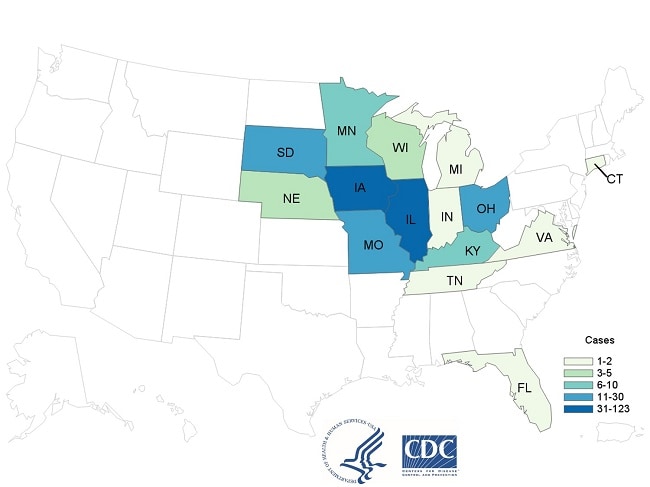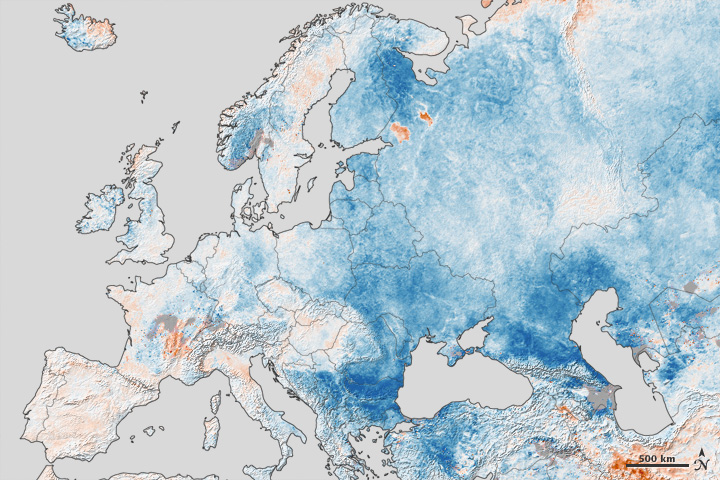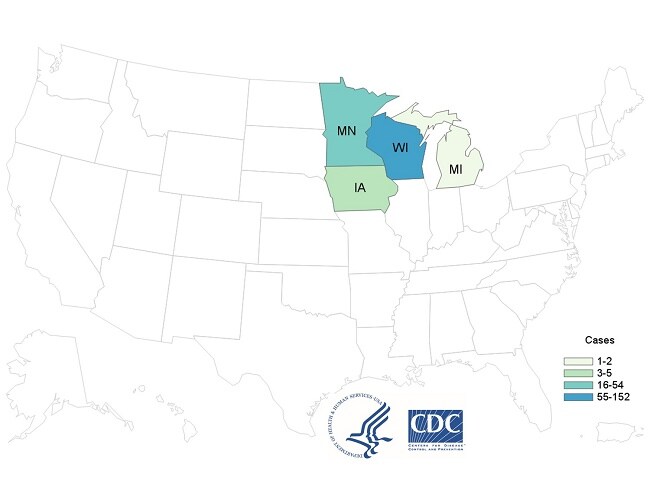Archive for the ‘Food-borne diseases’ Category
Cyclospora outbreak tied to McDonald’s salads: 395 cases
Saturday, August 4th, 2018Multistate Outbreak of Cyclospora Illnesses Likely Linked to Salads from McDonald’s
Thursday, August 2nd, 2018The FDA confirms the presence of Cyclospora in Fresh Express salad mix through new laboratory method; Fresh Express recalls expired products containing romaine lettuce.
July 31, 2018 Update
The FDA has confirmed the presence of Cyclospora in an expired salad mix, containing romaine lettuce and carrots, that was produced by the processor Fresh Express in Streamwood, Illinois.

On July 26, 2018, the FDA completed final analysis of an unused package of Fresh Express salad mix containing romaine lettuce and carrots, which had been distributed to McDonald’s. The analysis confirmed the presence of Cyclospora in that sample, though the expiration date for that product, July 19, had already passed. On July 27, the FDA informed Fresh Express of the results, and instructed Fresh Express to determine whether potentially contaminated product may still be on the market.
Fresh Express reported to FDA that the romaine from the same lot as the positive sample was not packaged for direct retail sale by Fresh Express and had already expired. Fresh Express committed to using recall procedures to inform companies that received additional products of concern about the sample result. Fresh Express also reported that the carrots in the sampled salad mix only went to McDonald’s.
On July 30, 2018, the U.S. Department of Agriculture’s Food Safety and Inspection Service (FSIS) issued a public health alert on beef, pork and poultry salad and wrap products potentially contaminated with Cyclospora that was distributed by Caito Foods LLC, of Indianapolis, Ind. The products were produced between July 15 and 18, 2018, with either “Best By,” “Enjoy by,” “Best if Sold By” or “Sell By” dates ranging from July 18 through July 23, 2018. Caito Foods had received notification from Fresh Express that the chopped romaine in these products was being recalled.
McDonald’s reports that they stopped using the Fresh Express salad mix at impacted restaurants in IL, IA, IN, WI, MI, OH, MN, NE, SD, MT, ND, KY, WV, and MO on July 13, 2018. The company has since reported that it has replaced the supplier of salads in those states. More information can be found in McDonald’s Statement.
In 2015, FDA set up a multidisciplinary workgroup to prioritize the development, validation and implementation of a method for detecting Cyclospora in fresh produce. In 2018, FDA began using the newly validated Cyclospora method. The availability of this method is a significant advancement in FDA’s ability to investigate outbreaks of cyclosporiasis and identify the parasite in foods.
The investigation is ongoing and the FDA is currently reviewing distribution and supplier information for romaine and carrots.
Fast Facts
- The FDA, CDC, along with state and local officials are investigating a multi-state outbreak of cyclosporiasis illnesses likely linked to salads from McDonald’s restaurants.
- On July 26, 2018, the FDA completed final analysis of an unused package of Fresh Express salad mix containing romaine lettuce and carrots, which had been distributed to McDonald’s. The analysis confirmed the presence of Cyclospora in that sample, though the expiration date for that product, July 19, had already passed. On July 27, the FDA informed Fresh Express of the results.
- FDA instructed Fresh Express to determine whether potentially contaminated product may still be on the market. Fresh Express reported to FDA that the romaine from the same lot as the positive sample was not packaged for direct retail sale by Fresh Express and had already expired. Fresh Express committed to using recall procedures to inform those companies that received this romaine about the sample result. Fresh Express also reported that carrots used in the mix were only sent to McDonald’s locations.
- On July 30, 2018, the U.S. Department of Agriculture’s Food Safety and Inspection Service (FSIS) issued a public health alert on beef, pork and poultry salad and wrap products potentially contaminated with Cyclospora that were distributed by Caito Foods LLC, of Indianapolis, IN. The products were produced between July 15 and 18, 2018, with either “Best By,” “Enjoy by,” “Best if Sold By” or “Sell By” dates ranging from July 18 through July 23, 2018. Caito Foods had received notification from Fresh Express that the chopped romaine in these products was being recalled.
- The CDC reports that 286 people in 15 states have become ill. There have been 11 hospitalizations and no deaths.
- The investigation is ongoing and the FDA is currently reviewing distribution and supplier information for romaine and carrots.
- As of July 13, 2018, McDonald’s decided to voluntarily stop selling salads at impacted restaurants in IL, IA, IN, WI, MI, OH, MN, NE, SD, MT, ND, KY, WV, and MO. The company has since reported that it has replaced the supplier of salads in those states. More information can be found in McDonald’s Statement.
- Consumers who have symptoms of cyclosporiasis should contact their health care provider to report their symptoms and receive care. Most people infected with Cyclospora develop diarrhea, with frequent, sometimes explosive, bowel movements. Other common symptoms include loss of appetite, weight loss, stomach cramps/pain, bloating, increased gas, nausea, and fatigue. Vomiting, body aches, headache, fever, and other flu-like symptoms may be noted. Some people who are infected with Cyclospora do not have any symptoms. If not treated, the illness may last from a few days to a month or longer. Symptoms may seem to go away and then return one or more times (relapse).
- At this time, we do not have evidence to suggest that this cluster of illnesses is related to the ongoing Cyclospora outbreak linked to Del Monte vegetable trays.
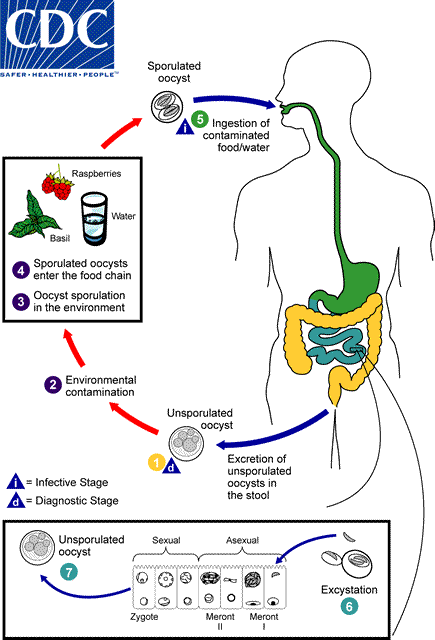
What is the Problem and What is Being Done About It?
FDA, CDC, state, and local partners are currently investigating several Cyclospora illnesses associated with McDonald’s locations in IA, IL, IN, KY, MN, MO, NE, OH, SD, and WI.
CDC has reported 286 laboratory-confirmed cases of cyclosporiasis in persons from CT, FL, IA, IL, IN, KY, MI, MN, MO, NE, OH, SD, TN, VA and WI who reportedly consumed salad products from several McDonald’s locations. The Florida case-patient purchased a salad while traveling in Kentucky and the Connecticut, Michigan, Tennessee, and Virginia case-patients purchased salads while traveling in Illinois.
On July 26, 2018, the FDA completed final analysis of an unused package of Fresh Express salad mix containing romaine lettuce and carrots, which had been distributed to McDonald’s. The analysis confirmed the presence of Cyclospora in that sample, though the expiration date for that product, July 19, had already passed. On July 27, the FDA informed Fresh Express of the results.
Fresh Express reported to FDA that the romaine from the same lot as the positive sample was not packaged for direct retail sale by Fresh Express and had already expired. Fresh Express committed to using recall procedures to inform those companies that received this romaine about the sample result.
On July 30, 2018, the U.S. Department of Agriculture’s Food Safety and Inspection Service (FSIS) issued a public health alert on beef, pork and poultry salad and wrap products potentially contaminated with Cyclospora that were distributed by Caito Foods LLC, of Indianapolis, Ind. The products were produced between July 15 to 18, 2018, with either “Best By,” “Enjoy by,” Best if Sold By” or “Sell By” dates ranging from July 18 through July 23, 2018. Caito Foods had received notification from Fresh Express that the chopped romaine in these products was being recalled.
Fresh Express reported that the carrots in the mix only went to McDonald’s.
McDonald’s reports that they stopped using the Fresh Express salad mix at impacted restaurants in IL, IA, IN, WI, MI, OH, MN, NE, SD, MT, ND, KY, WV, and MO on July 13, 2018. The company has since reported that it has replaced the supplier of salads in those states. More information can be found in McDonald’s Statement.
The investigation is ongoing and the FDA is currently reviewing distribution and supplier information for romaine and carrots.
Consumers who have symptoms of cyclosporiasis should contact their health care provider to report their symptoms and receive care. Most people infected with Cyclospora develop diarrhea, with frequent, sometimes explosive, bowel movements.
Other common symptoms include loss of appetite, weight loss, stomach cramps/pain, bloating, increased gas, nausea, and fatigue. Vomiting, body aches, headache, fever, and other flu-like symptoms may be noted. Some people who are infected with Cyclospora do not have any symptoms. If not treated, the illness may last from a few days to a month or longer. Symptoms may seem to go away and then return one or more times (relapse).
In 2015, FDA set up a multidisciplinary workgroup to prioritize the development, validation and implementation of a method for detecting Cyclospora in fresh produce. In 2018, FDA began using the newly validated Cyclospora method. The availability of this method is a significant advancement in FDA’s ability to investigate outbreaks of cyclosporiasis and identify the parasite in foods.
At this time, we do not have evidence to suggest that this cluster of illnesses is related to the ongoing Cyclospora outbreak linked to Del Monte vegetable trays.
What is Cyclospora?
Cyclospora cayetanensis is a microscopic parasite of humans. This parasite, when it contaminates food or water and is then ingested, can cause an intestinal illness called cyclosporiasis.
The Cyclospora parasite needs time (days to weeks) after being passed in a bowel movement to become infectious for another person. Therefore, it is unlikely that cyclosporiasis is passed directly from one person to another.
What are the Symptoms of Cyclosporiasis?
Most people infected with Cyclospora develop diarrhea, with frequent, sometimes explosive, bowel movements. Other common symptoms include loss of appetite, weight loss, stomach cramps/pain, bloating, increased gas, nausea, and fatigue. Vomiting, body aches, headache, fever, and other flu-like symptoms may be noted. Some people who are infected with Cyclospora do not have any symptoms. If not treated, the illness may last from a few days to a month or longer. Symptoms may seem to go away and then return one or more times (relapse).
Who is at Risk?
Anyone who consumed salads from McDonald’s in IA, IL, IN, KY, MN, MO, NE, OH, SD, and WI after May 20, 2018, could have been exposed to the pathogen. People can become infected with Cyclospora by consuming food or water contaminated with the parasite.
Also, at possible risk is anyone who consumed beef, pork and poultry salad and wrap products named in the July 30, 2018, public health alert issued by the U.S. Department of Agriculture’s Food Safety and Inspection Service (FSIS) after May 20, 2018.
What Do Restaurants and Retailers Need To Do?
- Retailers, restaurants, and other food service operators should always practice safe food handling and preparation measures. It is recommended that they wash hands, utensils, and surfaces with hot, soapy water before and after handling food. Wash and sanitize display cases and refrigerators where potentially contaminated products were stored.
- Wash and sanitize cutting boards, surfaces, and utensils used to prepare, serve, or store potentially contaminated products.
- Wash hands with hot water and soap following the cleaning and sanitation process.
- Regular frequent cleaning and sanitizing of food contact surfaces and utensils used in food preparation may help to minimize the likelihood of cross-contamination.
What Do Consumers Need To Do?
Consumers who have symptoms of cyclosporiasis should contact their health care provider to report their symptoms and receive care. Most people infected with Cyclospora develop diarrhea, with frequent, sometimes explosive, bowel movements. Other common symptoms include loss of appetite, weight loss, stomach cramps/pain, bloating, increased gas, nausea, and fatigue. Vomiting, body aches, headache, fever, and other flu-like symptoms (relapse).
Who Should be Contacted?
Contact your healthcare provider if you have diarrhea that lasts for more than three days. The FDA encourages consumers with questions about food safety to Submit An Inquiry, or to visit www.fda.gov/fcic for additional information.
People infected with the outbreak strains of Salmonella, by state of residence, as of July 30, 2018 (n=79)
Thursday, August 2nd, 2018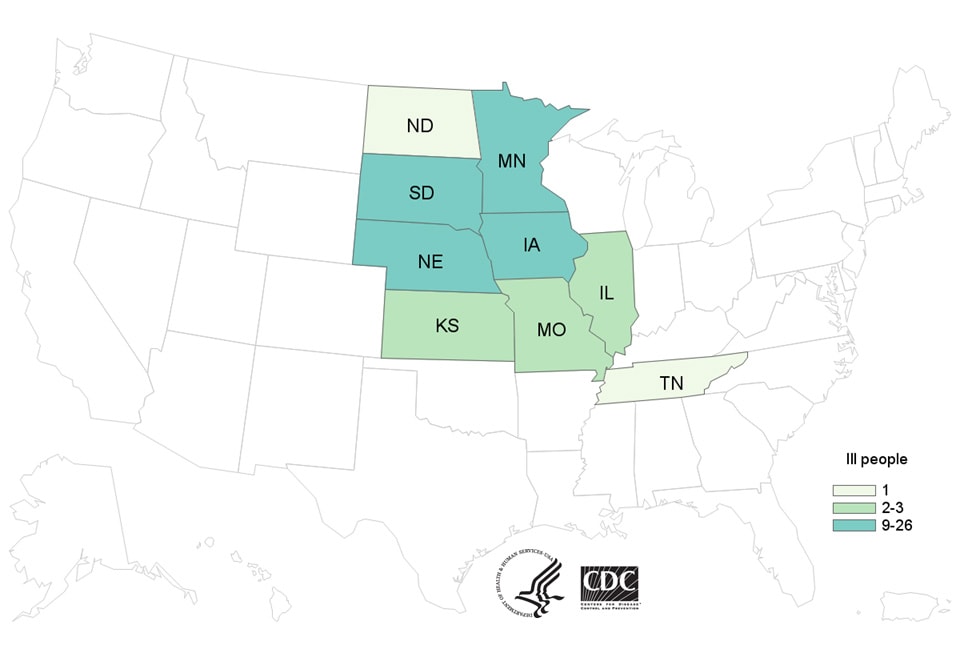
CDC, public health and regulatory officials in several states, and the U.S. Food and Drug Administration are investigating a multistate outbreak of Salmonella infections linked to Spring Pasta Salad purchased at Hy-Vee grocery stores.
Advice to Consumers, Restaurants, and Retailers

At A Glance
- Reported Cases: 79
- States: 9
- Hospitalizations: 18
- Deaths: 0
- Recall: Yes
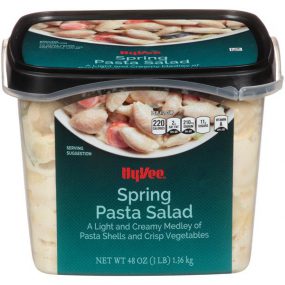
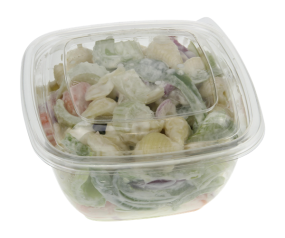
- On July 17, 2018, Hy-Vee, Inc. recalled its Spring Pasta Salad because it might be contaminated with Salmonella.
- Do not eat recalled Hy-Vee Spring Pasta Salad.
- The Spring Pasta Salad includes shell pasta, carrots, celery, cucumbers, green pepper, onion, and mayonnaise.
- The recalled pasta salad was sold in 1-pound (16 oz.) and 3-pound (48 oz.) plastic containers or may have been scooped at the deli counter into clear plastic containers.
- The recalled pasta salad was sold in all Hy-Vee grocery stores in Illinois, Iowa, Kansas, Minnesota, Missouri, Nebraska, South Dakota, and Wisconsin.
- The expiration dates for the recalled pasta salad range from June 22, 2018 to August 3, 2018.
- Return the recalled Spring Pasta Salad to the store for a refund or throw it away. Even if some of it was eaten and no one got sick, do not eat it.
- If you stored recalled pasta salad in another container, throw the pasta salad away. Thoroughly wash the container with warm, soapy water before using it again, to remove harmful germs that could contaminate other food.
- Contact a healthcare provider if you think you got sick from eating recalled Hy-Vee Spring Pasta Salad.
- Restaurants and retailers should not serve or sell recalled Hy-Vee Spring Pasta Salad.
Latest Outbreak Information

- Fifty-eight more ill people from nine states were added to this outbreak since the last update on July 18, 2018. Four more states reported ill people: Illinois, Kansas, North Dakota, and Tennessee.
- Salmonella enterica subspecies IIIb has been added to this investigation because two people were infected with this strain of Salmonella and with the outbreak strain of Salmonella Sandiego at the same time. A search of the CDC PulseNet database found six additional people infected with the strain of Salmonella enterica subspecies IIIb and these cases have also been added to the outbreak.
- A total of 79 people infected with the outbreak strains of Salmonella have been reported from nine states.
- Illnesses started on dates ranging from June 21, 2018, to July 15, 2018.
- Epidemiologic evidence indicates that Spring Pasta Salad purchased at Hy-Vee grocery stores is a likely source of the outbreak.
- This investigation is ongoing, and CDC will provide updates when more information is available.
Symptoms of Salmonella Infection

- Most people infected with Salmonella develop diarrhea, fever, and stomach cramps 12 to 72 hours after being exposed to the bacteria.
- The illness usually lasts 4 to 7 days, and most people recover without treatment.
- In some people, the diarrhea may be so severe that the patient needs to be hospitalized. Salmonella infection may spread from the intestines to the bloodstream and then to other places in the body.
- Children younger than 5 years, adults older than 65 years, and people with weakened immune systems are more likely to have a severe illness.
Investigation Details
August 1, 2018
Since the last update on July 18, 2018, 58 ill people have been added to this investigation. This includes six people who have been infected with a strain of Salmonella enterica subspecies IIIb, and two people infected with this strain and with the outbreak strain of Salmonella Sandiego at the same time.
As of July 30, 2018, 79 people infected with the outbreak strains of Salmonella Sandiego (71 people), Salmonella enterica subspecies IIIb (6 people), or both (2 people) have been reported from nine states. A list of the states and the number of cases in each can be found on the Map of Reported Cases page.
Illnesses started on dates ranging from June 21, 2018, to July 15, 2018. Ill people range in age from 1 year to 89, with a median age of 47. Among ill people, 67% are female. Out of 74 people with information available, 18 (24%) have been hospitalized. No deaths have been reported.
Illnesses that occurred after July 8, 2018, might not yet be reported due to the time it takes between when a person becomes ill and when the illness is reported. This takes an average of 2 to 4 weeks. Please see the Timeline for Reporting Cases of Salmonella Infection for more details.
State and local health officials continue to interview ill people and ask questions about the foods they ate and other exposures in the week before they became ill. Forty-seven (80%) of 59 people interviewed reported eating Spring Pasta Salad from Hy-Vee grocery stores in Iowa, Kansas, Minnesota, Nebraska, and South Dakota. The ill people in North Dakota and Tennessee traveled to states where Hy-Vee grocery stores are located.
This investigation is ongoing, and CDC will provide updates when more information is available.
A multistate outbreak of multidrug-resistant Salmonella Reading infections linked to raw turkey products
Friday, July 20th, 2018Posted July 19, 2018 at 12:00 PM EDT
CDC and public health and regulatory officials in several states are investigating a multistate outbreak of multidrug-resistant Salmonella Reading infections linked to raw turkey products. The U.S. Department of Agriculture’s Food Safety and Inspection Service (USDA-FSIS) is monitoring the outbreak.
Latest Outbreak Information
At A Glance
- Reported Cases: 90
- States: 26
- Hospitalizations: 40
- Deaths: 0
- Ninety people infected with the outbreak strain of Salmonella Reading have been reported from 26 states.
- Forty people have been hospitalized, and no deaths have been reported.
- Epidemiologic and laboratory evidence indicates that raw turkey products from a variety of sources are contaminated with Salmonella Reading and are making people sick.
- In interviews, ill people report eating different types and brands of turkey products purchased from many different locations. Two ill people lived in a household where raw turkey pet food was fed to pets.
- The outbreak strain has been identified in samples taken from raw turkey pet food, raw turkey products, and live turkeys.
- A single, common supplier of raw turkey products or of live turkeys has not been identified.
- The outbreak strain of Salmonella Reading is present in live turkeys and in many types of raw turkey products, indicating it might be widespread in the turkey industry. CDC and USDA-FSIS have shared this information with representatives from the turkey industry and asked about steps that they may be taking to reduce Salmonella contamination.
Advice to Consumers and Retailers
Always handle raw turkey carefully and cook it thoroughly to prevent food poisoning. This outbreak is a reminder that raw turkey products can have germs that spread around food preparation areas and can make you sick.
CDC is not advising that consumers avoid eating properly cooked turkey products, or that retailers stop selling raw turkey products.
CDC advises consumers to follow these steps to help prevent Salmonella infection from raw turkey:
- Wash your hands. Salmonella infections can spread from one person to another. Wash hands before and after preparing or eating food, after contact with animals, and after using the restroom or changing diapers.
- Cook raw turkey thoroughly to kill harmful germs. Turkey breasts, whole turkeys, and ground poultry, including turkey burgers, casseroles, and sausage, should always be cooked to an internal temperature of 165°F to kill harmful germs. Leftovers should be reheated to 165°F. Use a food thermometer to check, and place it in the thickest part of the food.
- Don’t spread germs from raw turkey around food preparation areas. Washing raw poultry before cooking is not recommended. Germs in raw poultry juices can spread to other areas and foods. Thoroughly wash hands, counters, cutting boards, and utensils with warm, soapy water after they touch raw turkey. Use a separate cutting board for raw turkey and other raw meats if possible.
- CDC does not recommend feeding raw diets to pets. Germs like Salmonella in raw pet food can make your pets sick. Your family also can get sick by handling the raw food or by taking care of your pet.
CDC will update the advice to consumers and retailers if more information comes available, such as a supplier or type of raw turkey product linked to illness.
Symptoms of Salmonella Infection
- Most people infected with Salmonella develop diarrhea, fever, and stomach cramps 12 to 72 hours after being exposed to the bacteria.
- The illness usually lasts 4 to 7 days, and most people recover without treatment.
- In some people, the diarrhea may be so severe that the patient needs to be hospitalized. Salmonella infection may spread from the intestines to the bloodstream and then to other places in the body.
- In rare cases, Salmonella infection can cause death unless the person is treated promptly with antibiotics.
- Children younger than 5 years of age, adults older than 65 years of age, and people with weakened immune systems are more likely to have severe illness.
- For more information, see the CDCSalmonella website.
Investigation Details
July 18, 2018
CDC and public health and regulatory officials in several states are investigating a multistate outbreak of Salmonella Reading infections linked to raw turkey products. The U.S. Department of Agriculture’s Food Safety Inspection Service (USDA-FSIS) is monitoring the outbreak.
Public health investigators are using the PulseNet system to identify illnesses that may be part of this outbreak. PulseNet is the national subtyping network of public health and food regulatory agency laboratories coordinated by CDC. DNA fingerprinting is performed on Salmonella bacteria isolated from ill people by using techniques called pulsed-field gel electrophoresis (PFGE) and whole genome sequencing (WGS). CDC PulseNet manages a national database of these DNA fingerprints to identify possible outbreaks. WGS gives a more detailed DNA fingerprint than PFGE. WGS performed on Salmonella from ill people in this outbreak showed that they are closely related genetically. This means that the ill people are more likely to share a common source of infection.
As of July 11, 2018, 90 people infected with the outbreak strain of Salmonella Reading have been reported from 26 states. A list of the states and the number of cases in each can be found on the Map of Reported Cases page.
Illnesses started on dates from November 20, 2017, to June 29, 2018. Ill people range in age from less than 1 year to 91, with a median age of 41. Sixty-one percent are female. Of 78 people with information available, 40 (51%) have been hospitalized. No deaths have been reported.
Investigation of the Outbreak
In interviews, ill people answered questions about the foods they ate and other exposures in the week before they became ill. Of 61 people interviewed, 37 (61%) people interviewed reported preparing or eating turkey products that were purchased raw, including ground turkey, turkey pieces, and whole turkey. Ill people reported buying many different brands of raw turkey products from multiple stores. Also, two of the 61 ill people interviewed became sick after pets in their home ate raw ground turkey pet food. Three of the 61 ill people interviewed worked in a facility that raises or processes turkeys, or lived with someone who did.
The outbreak strain of Salmonella Reading has been identified in samples from raw turkey pet food in Minnesota, from raw turkey products from 19 slaughter and 6 processing establishments, and from live turkeys from several states. The samples collected by FSIS at these slaughter and processing establishments were part of FSIS’ routine testing under the Salmonella performance standards. Furthermore, WGS showed that the Salmonella strain from these samples is closely related genetically to the Salmonella strain from ill people. This result provides more evidence that people in this outbreak got sick from preparing raw turkey products.
WGS analysis did not identify predicted antibiotic resistance in 68 isolates from 28 ill people and 40 food and animal samples. However, 33 isolates from ill people and 49 isolates from food and animal samples contained genes for resistance to all or some of the following antibiotics: ampicillin, streptomycin, sulfamethoxazole, tetracycline, gentamicin, and kanamycin. Testing of four outbreak isolates using standard antibiotic susceptibility testing by CDC’s National Antimicrobial Resistance Monitoring System (NARMS) laboratory confirmed these results. This resistance likely will not affect the choice of antibiotic used to treat most people since these antibiotics are not normally used to treat Salmonella infections.
Available data indicate that this strain of Salmonella Reading may be present in live turkeys and in raw turkey products. A single, common supplier of raw turkey products or of live turkeys has not been identified.
CDC and USDA-FSIS shared the results of the investigation with representatives from the turkey industry to make them aware of the outbreak and resulting illnesses, and to ask them about steps they may be taking to reduce Salmonella contamination. Because investigation results suggest this strain of Salmonella Reading is present in both live turkeys and in raw turkey products, further investigation and interventions to reduce the prevalence of this strain should target both the live turkey industry and turkey processing facilities. Consumers should be aware that raw turkey may be contaminated with germs and consumers should always follow steps to prevent Salmonella infection from these products.
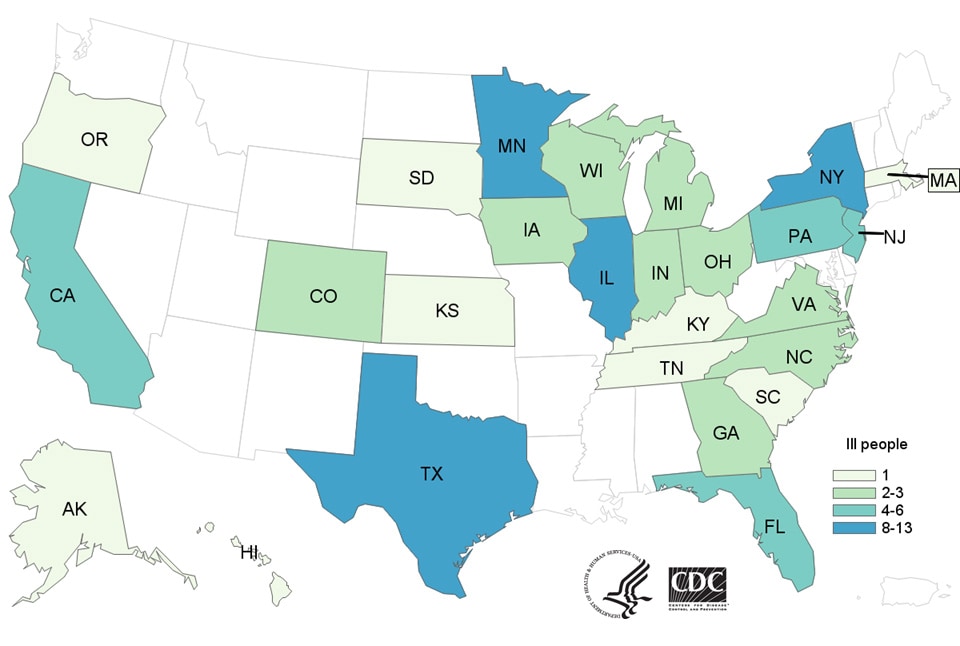
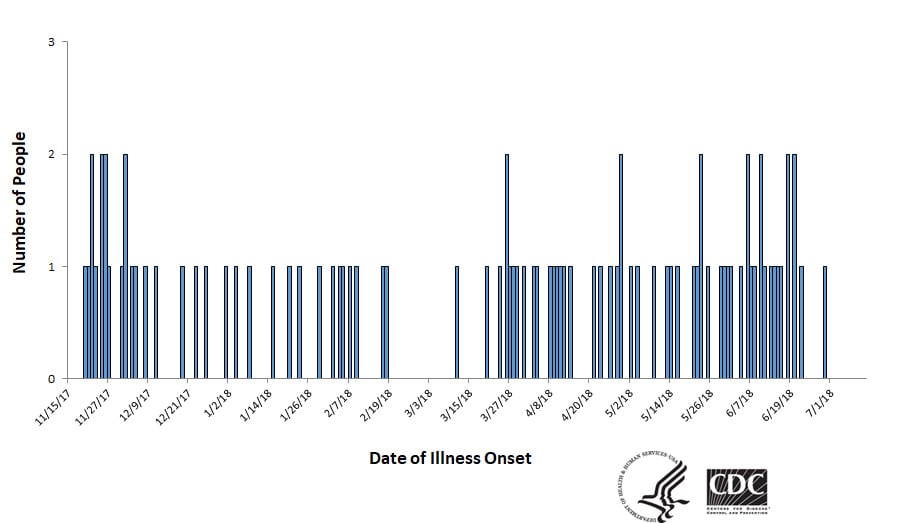
A multistate outbreak of Salmonella Sandiego infections linked to Spring Pasta Salad purchased at Hy-Vee grocery stores.
Thursday, July 19th, 2018At A Glance
- Reported Cases: 21
- States: 5
- Hospitalizations: 5
- Deaths: 0
- Recall: Yes
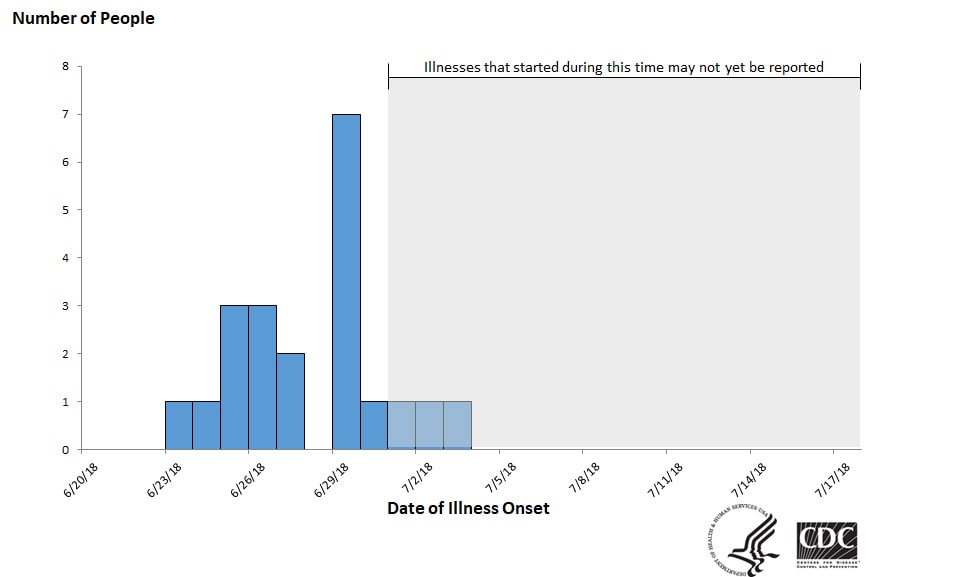
| State | Ill People |
|---|---|
| Iowa | 8 |
| Minnesota | 7 |
| Missouri | 1 |
| Nebraska | 4 |
| South Dakota | 1 |
| Total | 21 |
Three people have died and 60 others hospitalised since Thursday, after possibly drinking tainted rice wine
Tuesday, July 17th, 2018A Cyclospora outbreak potentially associated with McDonald’s salads
Saturday, July 14th, 2018For Immediate Release: July 13, 2018
Media Inquiries: Peter Cassell, 240-402-6537, peter.cassell@fda.hhs.gov
Consumer Inquiries: 888-INFO-FDA
The U.S. Food and Drug Administration and the Centers for Disease Control and Prevention, along with state and local officials, are investigating a multi-state outbreak of Cyclospora infections. Yesterday, the Illinois and Iowa Health Departments identified McDonald’s salads as being potentially linked to cases of Cyclospora in both states. McDonald’s has voluntarily stopped selling salads at affected restaurants across 14 states and the CDC reports that 61 people across seven states have gotten sick.
“We understand how important it is to quickly identify the cause of this foodborne outbreak to help reduce additional illness and we’re working closely with our colleagues at CDC and state partners to get more answers. There’s still a lot to learn about this outbreak, and we appreciate that McDonald’s has removed salads from the menu in impacted restaurants while we work to determine whether they are in fact linked to the outbreak. We will continue to share our progress toward these goals and provide updates as we learn more,” said FDA Commissioner Scott Gottlieb, M.D. “It’s early in the investigation, but we are taking steps now to help ensure consumers know about the potentially contaminated product so that they can better protect themselves or seek treatment, especially if they have signs or symptoms of a Cyclospora infection. This is especially important as Cyclospora is not commonly tested for in a health care setting, so consumers who may think they have been exposed should raise their concerns with their health care professional.”
As part of this emerging investigation, the FDA is actively working with McDonald’s to identify the common ingredients in the salads identified by those who became sick and to trace back those ingredients through the supply chain.
Cyclospora is a parasite that can cause severe intestinal illness, but can be treated. Although it’s unknown exactly how food and water become infected with Cyclospora, people should be aware that rinsing or washing food is not likely to remove it.
The following is an update on the FDA’s ongoing investigation into this outbreak.
| Outbreak Investigation Summary | Advice for Consumers |
|---|---|
|
|
The FDA is continuing to investigate this outbreak and will share more information as it becomes available. For more information on this investigation:
- FDA website on Cyclospora
- CORE outbreak investigations
- McDonald’s Statement

- Illinois Department of Public Health Press Release
- Iowa Department of Public Health Press Release
###


